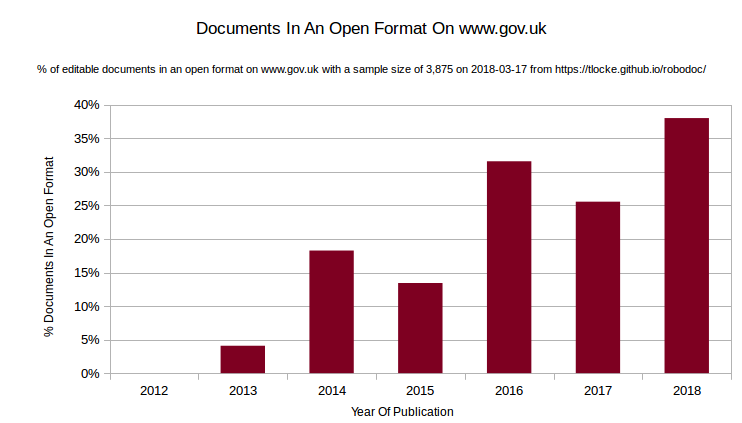https://www.gov.uk/government/uploads/system/uploads/attachment_data/file/686899/Country_returns_guide_-_March_2018.xls published
in ODF. Here's my
latest
tweet:
@ukhomeoffice The spreadsheet on https://www.gov.uk/government/publications/country-returns-guide is in a proprietary format. Can you publish it in an open format instead please? Thanks! https://tlocke.github.io/robodoc/I thought it would be good to thank people when they had published docs in an open format, rather than complaining all the time, so I tweeted this:
@ukhomeoffice @gdsteam Thanks for publishing the spreadsheet at https://www.gov.uk/government/publications/home-office-august-2017 in an open format! https://tlocke.github.io/robodoc/
I did another run on 17th March, and the results are available for download. This time it looked at 80,000 pages and it showed that 21% of documents are in an open format. Here's a graph of the results broken down by year of publication:

The latest run of the RoboDoc crawler tells us that of the documents published in 2018, only 12% were in an open format. Now that we've got some reasonable data, the next question is how to use it to increase that percentage. I tweeted about this, and here's the conversation:
@OpenForumEurope only 14% of editable docs on http://www.gov.uk are in an open format https://tlocke.github.io/robodoc/ not sure where to go from here
Maël Brunet @MaelB
Mar 6
Replying to @t_locke @OpenForumEurope
Cool project ! We did something a while ago at EU level http://fixmydocuments.eu/ the figures we found were even lower than yours in the UK.
Maël Brunet
@MaelB
Mar 6
Also unsure what can be done to improve. We tried a bit of name & shame + contacting the relevant services but there's just so many documents out there. Unfortunately I think this is seen as a very low priority.
So, I've decided to pick a document that was published in a
proprietary in 2018:
https://www.gov.uk/government/uploads/system/uploads/attachment_data/file/686899/Country_returns_guide_-_March_2018.xls
and contact the government about that single document. On
the page
that links to this document, there's a link called 'Is there anything
wrong with this page?'. Clicking on the link reveals a form with two
fields. Here's what I submitted:
What were you doing?
Clicking on the link https://www.gov.uk/government/publications/country-returns-guide on the page https://www.gov.uk/government/publications/country-returns-guide.
What went wrong
The spreadsheet is in a proprietary format, but as I understand it, government policy is to publish spreadsheets in the open format ODF:
https://www.gov.uk/government/news/open-document-formats-selected-to-meet-user-needs
Thanks for your help,
Tony Locke
tlocke@tlocke.org.uk
I'll post an update if I get a reply.